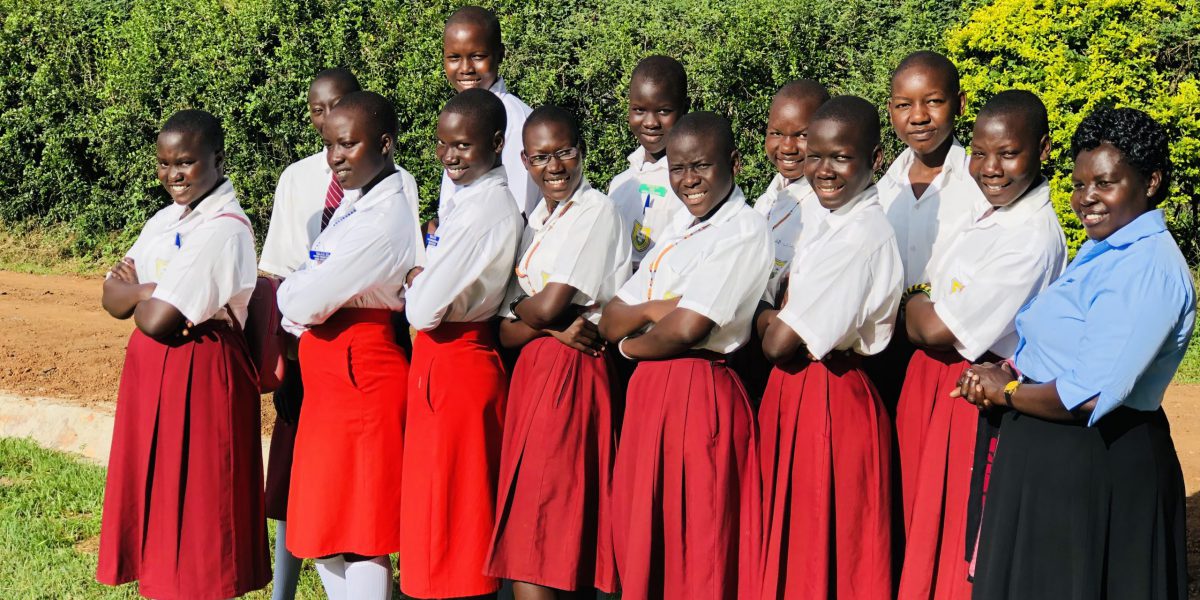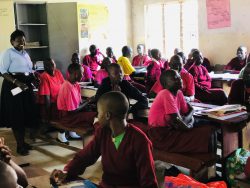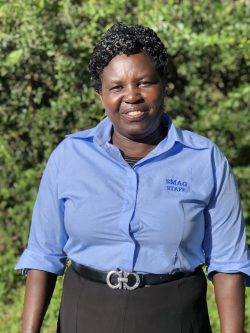
As I interviewed Mary Grace, I couldn’t help but imagine a mother hen sheltering her chicks from a downpour of rain with her wings. Like many teachers working in similar conditions, Mary Grace does her best to protect all her students from the storms of life, even though it is overwhelming. These teachers remain strong and hopeful, covering their students with metaphorical wings.
Ms. Kakayo Mary Grace is a senior teacher at St. Mary’s Assumpta Girls Secondary School in Adjumani District in the northwestern part of Uganda. She chose her path deliberately and has enjoyed every moment as a teacher. In her words:
Mary says that her class in Adjumani, one of the poorest regions in the country, consists of 50% refugee girls, making for overcrowded classrooms, an imbalanced teacher-student ratio, and limited teaching materials. Adjumani also has the largest number of refugees in Uganda.
Mary Grace faces significant issues with the refugee girls at St. Mary’s Assumpta, the only all-girls secondary school in Adjumani where most students are teenagers. These girls face challenges as they navigate puberty while dealing with upheaval in their home lives. Additionally, their parents struggle to pay school fees and provide school requirements.
Due to their economic situations, these young girls find it difficult to blend in with the other girls. They constantly worry about being expelled for failing to pay school fees. Furthermore, most girls from the settlements are timid and struggle academically because they do not speak English, the language of instruction in Uganda. This language barrier causes them to shy away when they cannot comprehend a class concept.
Most refugees in Adjumani come from South Sudan, where cultural norms promote early marriage for girls, preventing them from seeking higher education. Typically, South Sudanese girls are deemed suitable for marriage at 14.

Mary Grace shared a story about a young girl who sought refuge at the school during a holiday. The girl was running away from her parents, who had planned to force her into marriage at a young age. Mary Grace and the school administration provided a safe haven for the girl and prevented an early marriage from happening.
Thanks to their intervention, the girl could complete her high school education and pursue a career in accounting. Mary Grace feels proud and grateful to have positively impacted the girl’s life, preventing her from becoming a child bride and allowing her to fulfil her potential.
Mary Grace has made it her life purpose to ‘mother’ these girls by listening to them and encouraging them to press on.
[…] Most of the time, I realize they need someone to listen to them and assure them that it will be okay.
I inquired about how she maintains a positive outlook despite the challenging circumstances. She confided that it takes a toll on her as these problems also impact the payment of teachers. Unpaid tuition causes unrest among the students, affecting the teachers’ ability to teach. This creates a vicious cycle where everyone is unsettled. However, she mentioned that many school administrators strive to secure scholarships for needy students, and she is forever thankful to JRS for their intervention in providing scholarships for some of these students.
According to Mary Grace, the school administration has helped safeguard the girls by actively looking out for refugee students and providing them with the best support possible. Mary Grace also mentioned that the Headmistress, Sr. Rebecca, has taken a stand against early marriages and has gained a reputation among parents who think she frustrates their cultural practices.
‘Sister has often kept girls in school during holidays because they come begging that they don’t want to go home. Their parents accuse her of detaining their daughters, yet they have arranged marriage for them!’

Mary Grace shared about the tribal conflicts in South Sudan that sometimes influence the girls’ behaviours. She learned of the longstanding conflict between the Dinka and Nuer tribes that the girls grew up with, causing them to discriminate against each other. However, Mary Grace believes this is unnecessary, considering their challenges. The school has deliberately trained the girls to work together, treat each other as sisters, and live harmoniously.
During our conversation with Mary Grace, I asked her to share a memorable experience. She excitedly recounted an incident involving a refugee student named Gladys, who was sad because her parents could not visit her on the designated parents’ visiting day. Mary Grace explained that in Uganda, boarding schools have specific days for parents to visit their children, and missing out on these visits can be disappointing. To help cheer Gladys up, Mary Grace gave her some treats and later decided to become her adoptive parent. In addition, Mary Grace shared that the other students heard about Gladys’s situation and generously collected items to share with her, making sure she didn’t feel left out.
Mary Grace has many stories to share, but her closing thoughts centered around her desire for an educational environment that welcomes everyone, regardless of their social standing. She hopes that girls receive special attention in this regard, as they often experience challenging situations that force them to mature beyond their years. Mary Grace also expressed her commitment to teaching for as long as possible, as it is her true calling.


